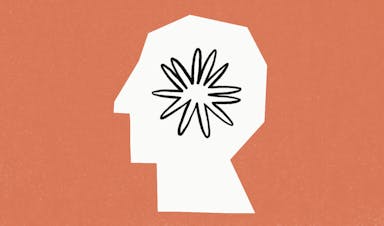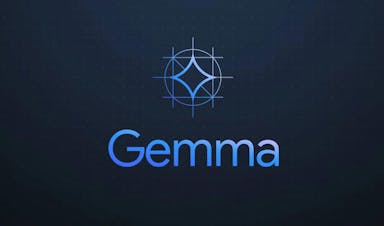One Year Wiser: Alula and Liya Shuster-Bier
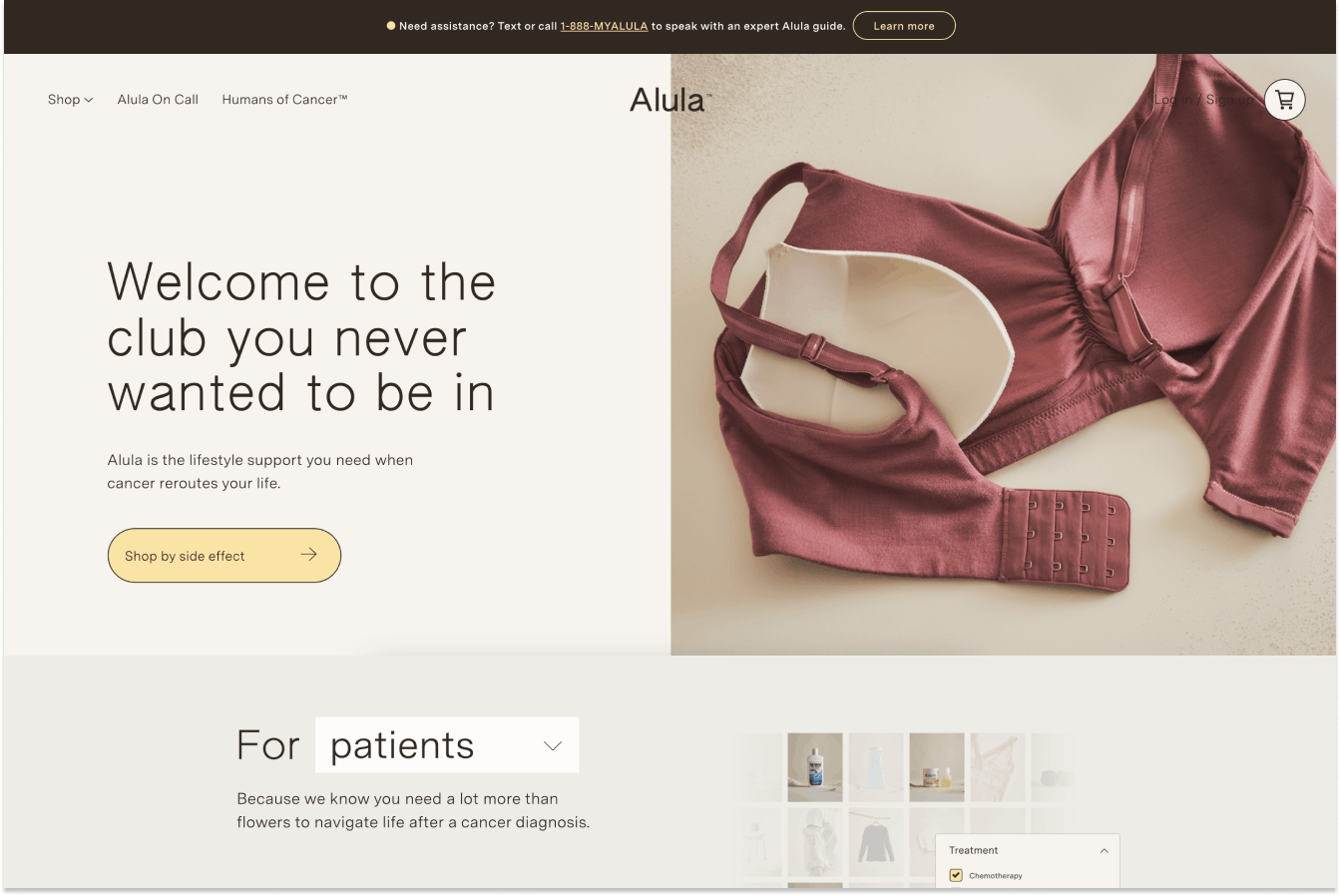
Making cancer less lonely. Building the product that she wishes had existed when she was diagnosed with cancer.
Tyler Swartz is a Group Product Manager at Reddit and writes a product-focused newsletter called, One Year Wiser, where he interviews founders and product makers one year after their product launch. Subscribe to One Year Wiser here and find him on Twitter: @tylerswartz.
Alula was founded by Liya Shuster-Bier from her hospital bed in the closing weeks of 2018. Cancer was very personal for her. A few years prior, her mom had been diagnosed with early stage breast cancer. Just as her mom was finishing her treatment and on the cusp of her own 30th birthday, Liya was diagnosed with a rare form of non-Hodgkin's lymphoma.
Alula was born out of the struggles that she faced when going through treatment.
"For much of treatment, I sourced the products and services myself. I hunted for answers in treatment waiting rooms, asking strangers for advice. I befriended my oncology nurses, collecting their product recommendations. I yearned for a marketplace that took the guesswork out of this! And, truthfully, I yearned to be able to register for the products that made sense at different moments of treatment so my love army had a place to go to see how my needs evolved and what would be helpful to send."
Liya quit her job in December 2019 to go all in on Alula. She raised a pre-seed round, pitching her vision of a digital resource that supports cancer patients through the entire lifecycle of cancer, from diagnosis and treatment through recovery, survivorship and bereavement. She finished fundraising in April of 2020 and got to work building out the product.
In January 2021, before they finished what they hoped would be the core product of Alula, the marketplace and registry, they launched a small product designed to help someone recently diagnosed with cancer find the right words to tell their friends and loved ones. She received positive feedback that the tool was helpful, but didn't see the engagement numbers that they'd hoped for.
In April 2021, about a year ago, they launched Alula. Patients were able to shop their marketplace (curated by patients and survivors) and create a Recovery Registry for all the items they might need during their cancer treatment and recovery.
In speaking with Liya, I learned that they are expanding the scope of Alula and shifting to becoming a medical provider so that they can be more fully integrated into cancer care hospitals' services, and ultimately, help a greater number of people.
In our conversation, Liya talks about:
- How oncologists are focused on researching the cure and facilitating the cure, but not the whole patient experience
- Their initial product and it's evolution
- How she recognized the need to expand the vision of their product to become more fully integrated into the patient workflow at cancer care hospitals
- The importance of having a long-term vision but still being nimble and adjusting as you learn
- The book she recommends the most
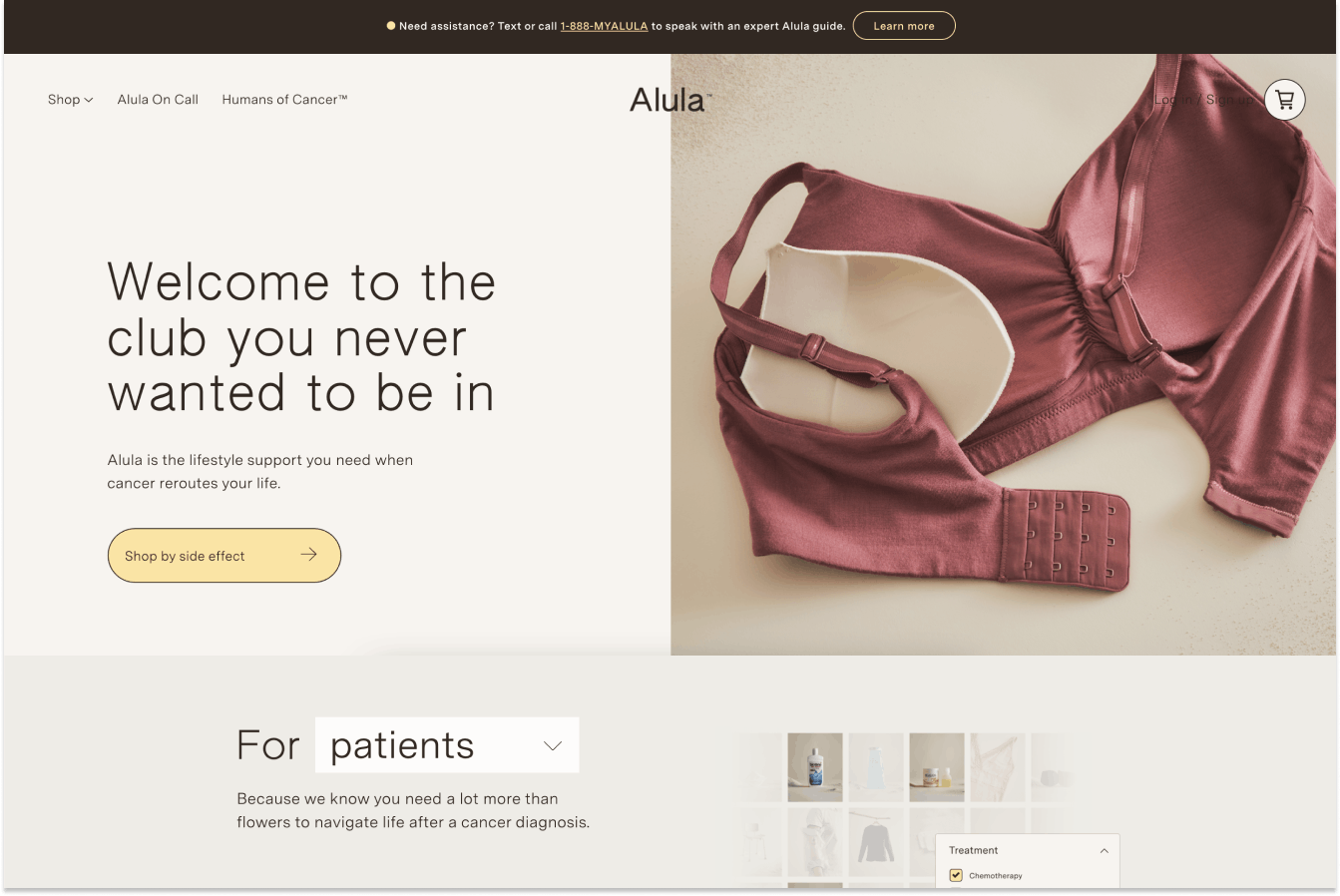
Alula homepage (March 2022)
My questions are in bold; this interview has been lightly edited for clarity.
Let’s start at the beginning. Can you give me a quick overview of how Alula started?
Liya Shuster-Ber: Alula was born out of more than five years of personal R&D. My mom was diagnosed with early stage breast cancer in 2016 and I was diagnosed with a rare form of non-Hodgkin's lymphoma in 2018— on the cusp of my 30th birthday. Through both of our experiences, we were surprised at how our brilliant oncologists at premiere cancer centers were failing to equip us with managing our “quality of life,” i.e. all of the side effects that we were, and still are, experiencing as a result of our treatment.
For instance, after my mom's mastectomy, she didn't receive any guidance from her oncologist on where to find post-op mastectomy bras. I vividly remember her reading on a Reddit thread that she should get a pillow to hold between her post-surgical wrapped breast and the seatbelt of her car so she could drive back and forth to the hospital without pain and without impacting her wound. Throughout 2016 and 2017, between multiple surgeries and doctors appointments, my mom kept coming to me for advice on how to improve her comfort. She was spending so much time on Google and Reddit searching for advice and tips from other patients. She was craving a one stop destination for her to access everything, or, ideally, information directly from her doctor. But, I wanted her to focus on getting better.
It wasn't until I was diagnosed, just a few months after my mom finally wrapped up treatment that I became the one complaining to my mom about all the side effects accumulating in my system from chemotherapy radiation. My oncologist didn't know how to help me pick out a wig and deal with the hair loss, or help me navigate medically induced menopause or lymphedema, or help me with all of the other things I ended up constantly getting diagnosed with.
Of course, if I needed to be hospitalized I always received excellent care right away. But it became clear to me that there were two tiers of care. The system was immensely prepared to deliver the first tier: precision medicine that would ultimately cure you of cancer. But the second tier, one of side effects and quality of life impairments, was relegated to other people across the care delivery flow. Or, most commonly, you were on your own.
At Alula we're building out a product that helps patients and caregivers identify how to mitigate the side effects and improve their quality of life as early in their treatment plan as possible. Our goal is that within two weeks of a patient learning what their treatment plan entails— meaning that they have their diagnosis and they know their regimen of either chemotherapy, surgery, or radiation— they will reach out to Alula, speak to an oncology nurse on our platform and assess what they need to be equipped at home to bear the myriad of side effects.
Our goal is to build a moat of radical honesty around the side effects. Cancer patients need to be prepared for what is going to happen to them. Ultimately, we want to empower patients to have these conversations with their doctors.
That’s a very powerful founding story, thanks for sharing. I believe your initial product was a gift or care registry for cancer patients. Can you tell me about the initial product that you launched and how you’ve evolved the product?
LSB: We've been through a maze of product iteration. When Alula first launched, it was this super-MVP Squarespace store that was powered by affiliate links to the products that my mom and I had used through our cancer journeys.
Over time, we took it to doctors at Memorial Sloan-Kettering and realized that to get this to scale we need to make sure we are building something that has oncologist buy-in. What we're building has the foundation to become a digital therapeutic and ultimately by helping patients better manage their side effect. By merging a telehealth solution with the ability for patients to equip themselves at home with the OTC products they need to manage their symptoms from treatment, this will help get more patients through treatment and improve their chances of surviving their cancer diagnosis.
In order to achieve these lofty goals, we want to bring Alula directly into the patient workflow. Even from day one, before I had venture funding, I was trying to get a sense of how we could use oncologists effectively as influencers, because they are the most powerful shapers of who cancer patients trust. As I mentioned earlier, the reality is patients are not always getting this information from their oncological providers, so patients go to Dr. Google and Dr. Reddit. So, our goal with Alula is to bridge these two worlds and demonstrate to healthcare systems the real opportunity here— both for patient clinical outcomes as well as for their internal operations as a partner.
Going back a bit, you said that oncologists didn't really give you advice on managing the side effects and that you want to bridge that gap. Why did they not help when it came to managing side effects from the treatment?
LSB: Over the course of my journey, I had many conversations that helped me realize that oncologists and their teams are focused on researching the cure and facilitating the cure. That’s exactly what we want them to be focused on. Some of my questions were just outside their zone of genius.
I vividly remember when my doctor told me that within two weeks of starting the first-line therapy for my cancer, I would lose my hair. My natural response to that was: “OK, I've seen cancer patients buying wigs. Who do you recommend I buy from, and what’s the process like?” My doctor gave me a piece of paper that listed three wig companies in Manhattan— just their name, phone number and address. No details about how much I should spend, what the pros and cons were, or how the shops differed.
That oncologist was an expert on my rare subtype of lymphoma and I am grateful for his insights. But that sort of support was outside his zone of genius. Giving me advice on where to buy a wig isn't what he's paid to do. And he truly didn't know! I appreciate that he was honest about it.
With oncologists focused on curing cancer, we need to recognize that the cancer patients of today become tomorrow's fill-in-the-blank patients. This is because the side effects of treating cancer create a variety of medical complications in the future months and years of their lives. Alula can fill that gap and be the cancer survivorship clinic.
Your initial product was very much focused on, as you put it on the landing page, “leveraging your love army” with a registry for products you might need during cancer treatments to manage side effects. There was another product to help people who might have trouble finding the right words when they need to share with their friends and family that they’ve been diagnosed.
Now you're evolving your product to something bigger and more integrated into the cancer journey. How did you recognize that you needed to make that shift? Were you not seeing top line growth for the initial product or was it something else?
LSB: We launched this radically-honest platform focused on cancer care navigation, and many components of the practical everyday needs. One was side effect management. One was communication hurdles. One was user-generated content on how to manage these debilitating and life-altering side effects. And another one was a tool to help coordinate your army of supporters towards your clinical outcome through a care calendar and a registry product.
After six months, we've now seen the performance of these different aspects, and it’s interesting. Some of the products we built really captivated people's interest. Users really liked our “finding the words” product. Usage was low, but people were giving us really positive feedback saying that they wished they had had it when they were diagnosed. But we didn't see the engagement numbers that supported continuing to build out that product.
Taking a step back, we realized that there were other companies that have tremendous brand recognition that are helping patients solve some of these pain points. When we looked at our initial six months of traction to make decisions on where to invest, we saw dramatic outperformance on the marketplace. Specifically on the need to combine a smart UI, one stop shopping, and clinical guidance to prep for side effect management.
Honestly, it really felt like a gift that it was so clear cut from the user data. Plus, the pandemic has shifted how healthcare is delivered, and my experience as a patient has also evolved over the last 18 months. I have been diagnosed almost every six months with something new— medically induced menopause, lymphedema on the left side of my body, radiation fibrosis in my chest and my back. I’ve once again had to quarterback my treatment and have found that no one is helping me make these decisions and figure out what's worth accessing. What are edits to my regimen? What is dangerous to me?
My experiences over the last 18 months have helped inform the product roadmap. We’re now hoping to acquire patients in their everyday triage while they're in treatment. But what we've also learned is that because curative cancer medicine is so successful, patients are living longer than ever before in history with new medical needs that are showing up in their bodies as they age. There is a huge need to have a place like Alula where they can assess that, and our new direction aims to fill that gap.
To acquire customers during their treatment are you partnering with hospitals and oncologists?
LSB: Yes! I hired the director of oncology operations from New York Presbyterian, who is now our head of clinical strategy and operations. We are also hiring a chief medical officer and building a clinical staff. We're in the process of becoming a provider and creating a care plan around managing side effects and ultimately selling Alula as a product to hospital systems.
Okay, now the quick fire round of questions. What are you most proud of from the past year?
LSB: I'm really proud of building a company in the middle of a once-in-a-century pandemic. I don't know if zero-to-one is meant to be built from multiple people's apartments across the country, but we navigated through that and continued to foster invention, creativity and collaboration. I'm really proud of that.
What's been the most challenging part of the past year?
LSB: I had a stem cell transplant a year before the pandemic started. March 12th, 2020 was my one year survivorship appointment at Memorial Sloan-Kettering, and my husband is a critical care cardiologist here in New York City. He was at Mount Sinai during the first surge.
Launching a business as an immunocompromised person in the pandemic, while living with a frontline worker, has been uniquely challenging. I’ve had to observe more protective quarantine measures than the average person, and for an extrovert that’s been hard. I really miss conferences, in-person interactions, meeting strangers, and back-to-back lunches at cafés.
What book do you recommend the most and why?
LSB: There's this book called Anticancer by David Servan-Schreiber. It's written by a scientist from the University of Pittsburgh who was diagnosed with brain cancer. He walks through the science of angiogenesis, which is the blood vessel supportive tissue that supports the growth of tumors. It's one of the first books that changed how I thought about whole-person care and the power of nutritional medicine, sleep medicine, spirituality, relationships, and friendships in facilitating your healing— not just in cancer, but for general wellness. We have a book club here at Alula, where everyone who joins the company reads this.
When I share my story, people always ask what I learned about how to prevent cancer. I think this book is not just great for prevention, but also for understanding how to amplify your care and treatment.
My last question for you, what do you know now that you wish you'd known a year ago?
LSB: I've learned that you have to have a strong view on what the year ahead is going to look like. Things change so fast— it’s important to be laser focused on the data and what it's telling you on a short term basis, and then use that to adjust your focus. You need to stay nimble.
The second lesson is the power of rest for creative ideation. I've learned how to set better boundaries so that I could reset my body and my brain, find inspiration and take in new information that's shaping the business. Building a company is super prefrontal cortex, and when you are in a fight or flight mode because of stress— whether it's from your company, whether it's from what's happening in society— that is not the best environment for new ideas and inventions.
The power and the connection of rest, resiliency, and creation has been one of my lessons this year. I'm really thankful for this aspect of the pandemic because I feel like it's helped us really reclaim control over how we spend our time, how we set up boundaries in our life, and how that ultimately satiates us as humans.
The power of rest reminds of the book I recently read by Elizabeth Gilbert called Big Magic, where she dives deep on how to live a creative life.
LSB: Yes, yes, I love that book.
Those are all of my questions, thanks for taking the time to speak with me today.
LSB: Thank you, take care!
---
I hope you enjoyed my interview with Liya and learned a few things. If you did, share it with others on Twitter. This helps more people discover my newsletter 😊 -Tyler
–
This article was originally published on One Year Wiser, a newsletter from Tyler Swartz, who interviews founders and product leaders one year after their product launch to learn how their products and businesses have evolved, their ups and downs journey along the way, and what their experiences over the past year have taught them.
Comments (8)
Michael Hill
I am a writer
staj hesap
aaaa
samara khan
i am a seo professional
samara khan
i am a seo professional
bba ca
hello
More stories
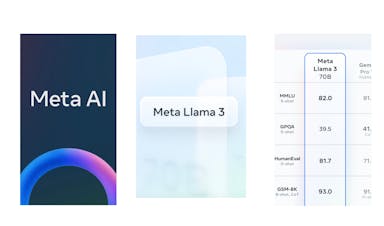
Kyle Corbitt · How To · 3 min read
What we've learned in 3 days of Llama 3
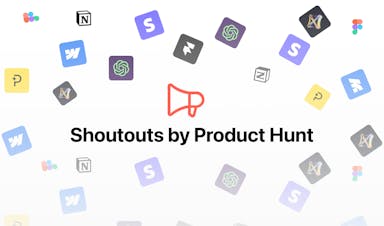
Aaron O'Leary · Announcements · 2 min read
Introducing Shoutouts

Finn Lobsien · Opinions · 5 min read
Can Devin AI Replace Product Managers?
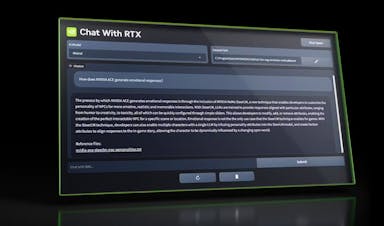
Aaron O'Leary · News · 2 min read
Meet Nvidia's new localized AI chatbot

Sarah Wright · News · 2 min read
The top 15 AI products from 2023
